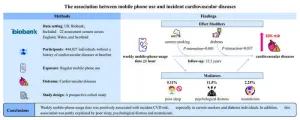(Press-News.org) Philadelphia, September 4, 2024 – A new study has found that regular mobile phone use was positively associated with incident cardiovascular diseases risk, especially in current smokers and individuals with diabetes. In addition, this association was partly attributed to poor sleep, psychological distress, and neuroticism. The article in the Canadian Journal of Cardiology, published by Elsevier, details the results of this large-scale prospective cohort study.
Yanjun Zhang, MD, Division of Nephrology, Nanfang Hospital, Southern Medical University, Guangzhou, China, explains, "Mobile phone use is a ubiquitous exposure in modern society, so exploring its impact on health has significant public health value. Radio-frequency electromagnetic fields (RF-EMF) emitted by mobile phones cause dysregulation of the hypothalamic-pituitary-adrenal axis, inflammatory responses, and oxidative stress, and are therefore expected to affect a variety of organs such as the heart and blood vessels. However, whether mobile phone use is associated with the risk of cardiovascular diseases remains uncertain."
Co-investigator Ziliang Ye, MD, Division of Nephrology, Nanfang Hospital, Southern Medical University, Guangzhou, China, adds, "We aimed to assess the prospective association of regular mobile phone use with incident cardiovascular diseases and explore the mediating effects of sleep and mental health. We found that compared with non-regular mobile phone users, regular mobile phone users had a significantly higher risk of incident cardiovascular diseases."
The study included 444,027 individuals from the UK Biobank without a history of cardiovascular diseases who self-reported on the frequency of their mobile phone use from 2006 to 2010. Regular mobile phone use was defined as at least one call per week. Using linked hospital and mortality records, the composite outcome of incident stroke, coronary heart disease, atrial fibrillation, and heart failure was ascertained over a median followup time of 12.3 years. Researchers also investigated the role of sleep patterns, psychological distress, and neuroticism.
Co-investigator Xianhui Qin, MD, Division of Nephrology, Nanfang Hospital, Southern Medical University, Guangzhou, China, notes, "We found that sleep patterns, psychological distress, and neuroticism may be potential mechanisms of the association between mobile phone use and cardiovascular diseases. A poor sleep pattern and poor mental health may adversely affect the development of cardiovascular diseases through disrupted circadian rhythm, endocrine and metabolic disruption, and increased inflammation. In addition, chronic exposure to RF-EMF radiation emitted from mobile phones could lead to oxidative stress and inflammatory response. Therefore, RF-EMF radiation exposure from mobile phones in combination with smoking and diabetes may have a synergistic effect in increasing cardiovascular diseases risk."
An accompanying editorial contextualizes the findings of the study. Given that the recruitment window of this study (2006-2010) occurred before the widespread use of modern smartphones, which are now more commonly used for other activities (e.g., entertainment, text messaging/email, social networking, etc.), the generalizability and current relevance of these findings require careful consideration.
Co-author of the editorial Nicholas Grubic, MSc, Dalla Lana School of Public Health, University of Toronto, ON, Canada, concludes, "While the current study suggests that using a mobile phone may moderately increase the risk of developing cardiovascular diseases, more conclusive evidence with valid measurements of mobile phone use is needed before this association becomes a concern for the general public. Maintaining responsible mobile phone habits should be a valuable component of an all-encompassing approach to supporting cardiovascular health. Before diving into hours of mindless ’doom-scrolling’ on your smartphone today, consider redirecting this time toward a more heart-healthy activity."
END
New research shows regular mobile phone use can increase the risk of cardiovascular diseases, especially in smokers and people with diabetes
A new study in the Canadian Journal of Cardiology investigates the association between mobile phone use, risk of heart diseases, and modifiable lifestyle factors
2024-09-04
ELSE PRESS RELEASES FROM THIS DATE:
Can you identify the new threat attracting Gen Z to nicotine use?
2024-09-04
COLUMBUS, Ohio – About half of adults can identify cigarettes and e-cigarettes, but just one in four would recognize oral nicotine pouches, and these easily available products are growing increasingly popular among teens and young adults, according to a recent study commissioned by The Ohio State University Comprehensive Cancer Center – Arthur G. James Hospital and Richard J. Solove Research Institute (OSUCCC – James).
Oral nicotine pouches are small packets filled with a flavored powder containing nicotine and other chemicals that are tucked between the lip and gums. ...
Generation and multiplexing of double-polarized terahertz vortex combs
2024-09-04
Introduction
As a new degree of freedom, the orbital angular momentum of electromagnetic waves exceeds the traditional frequency, phase, and amplitude, and is expected to promote the infinite expansion of channel capacity. Recently, a team of research professor Chao-Hai Du from Peking University and Professor Xiaofei Zang's research group from the University of Shanghai for Science and Technology have carried out in-depth cooperation. Based on the research foundation of both sides in the field of terahertz and metasurface, a new method of generating polarization-multiplexed terahertz vortex combs using all-silicon metasurface has been ...
A unified objective for dynamics model and policy learning in model-based reinforcement learning
2024-09-04
Recently, model-based reinforcement learning has been considered a crucial approach to applying reinforcement learning in the physical world, primarily due to its efficient utilization of samples. However, the supervised learned model, which generates rollouts for policy optimization, leads to compounding errors and hinders policy performance. To address this problem, the research team led by Yang YU published their new research on 15 August 2024 in Frontiers of Computer Science co-published by Higher Education ...
How to solve the challenges faced by the carbon sequestration function of Chinese plantations in the future?
2024-09-04
Since the first industrial revolution, the rapid development of the human economy and society has directly exacerbated the process of CO2 emission from human activities such as fossil fuel combustion, industrial processes, agriculture, and land use activities. With the continuous increase of global greenhouse gas concentration dominated by CO2, the greenhouse effect is becoming more and more obvious, and the trend of global warming is becoming more and more serious. To cope with the continuous warming of the global climate and mitigate ...
Sleep-deprived, cyberbullied teenagers addicted to smartphones now a common phenomenon
2024-09-04
Combine cyberbullying, smartphone use, lack of sleep and poor mental health, and you have the perfect storm for a teenage meltdown.
Australian researchers have polled more than 50,000 primary and secondary school students aged 7-19 years about the link between their sleep and nighttime phone habits, experience of cyberbullying and stress levels.
Researchers from the Behaviour-Brain-Body Research Centre at the University of South Australia found that across all genders and age groups, phone use overnight not only robbed children of sleep, but it also had a negative impact on their mental health, ...
Auburn researchers show novel drug rescues memory loss in Alzheimer’s mouse model
2024-09-04
AUBURN, AL — In a recent development in Alzheimer's disease research, Auburn University scientists have studied a new drug, troriluzole, that can prevent brain changes leading to memory loss and cognitive decline in a mouse model of the disease. This study, recently published in the Journal of Neurochemistry, is the first to show how troriluzole can target early-stage alterations associated with Alzheimer’s, providing new hope for potential treatments.
Dr. Miranda Reed, a Professor in the department ...
Study at Pennington Biomedical Research Center to evaluate THC, CBD benefits for dementia-related agitation
2024-09-04
Pennington Biomedical Research Center’s Dr. Jeff Keller is evaluating the potential for delta-9-tetrahydrocannabinol, or THC, and cannabidiol, or CBD, to reduce the behaviors indicating agitation, distress or anxiety in patients with Alzheimer’s disease or other forms of dementia. The study is designed for hospice-eligible patients who are either receiving hospice care or who are eligible for hospice, and who are exhibiting agitation concurrently with a diagnosis of dementia. There are currently no FDA-approved medications to treat agitation at the end-of-life stages in dementia patients.
The “Life’s End Benefits of Cannabidiol and ...
Illinois scientists to test modernized genetic model for optimized crop breeding
2024-09-04
URBANA, Ill. — The National Science Foundation (NSF) has funded University of Illinois Urbana-Champaign research that aims to connect the dots between quantitative and molecular genetics and improve crop breeding.
The four-year, $795,000 grant investigates new theories on how genetics influence complex crop traits, such as yield or grain quality. These traits are controlled by lots of different genes — sometimes hundreds or thousands — which makes untangling their contributions difficult. Crop breeders use a host of advanced genetic tools to predict and ...
Adolescent glioma subtype responds to CDK4/6 inhibitor
2024-09-04
Boston – CDK4/6 inhibitors, which are already FDA approved for the treatment of other forms of cancer, show early signs of promise in the treatment of a subtype of pediatric high-grade glioma, according to new research from Dana-Farber Cancer Institute and the Institute of Cancer Research in London. Treatment of a patient with a second relapse of this glioma subtype and no other treatment options resulted in 18 months of progression-free survival.
“We are finally starting to see more targeted therapies come out for different forms of brain cancer,” says senior author Mariella Filbin, MD, PhD, co-director ...
Study highlights importance of social media influencers in information dissemination during mpox outbreak
2024-09-04
A recent study shows social media influencers are more important than previously thought when it comes to getting out vital information in a crisis.
The study suggested partnerships that could improve public communication between governments, non-profits and social media influencers during crises. The study, conducted by UF/IFAS assistant professor Kimberly Kay Wiley, a researcher in the family, youth and community sciences department, and Bridgewater State University associate professor Seth Meyer, shows how these groups can collaborate to effectively disseminate information and manage public health emergencies on social media.
“In ...
LAST 30 PRESS RELEASES:
Four NYU faculty win Sloan Foundation research fellowships
Personal perception of body movement changes when using robotic prosthetics
Study shows brain responses to wildlife images can forecast online engagement — and could help conservation messaging
Extreme heat and drought at flowering could put future wheat harvests at risk
Harlequin ichthyosis: a comprehensive review of pathogenesis, diagnosis, and management
Smithsonian planetary scientists discover recent tectonic activity on the Moon
Government censorship of Chinese chatbots
Incorporating a robotic leg into one’s body image
Brain imaging reveals how wildlife photos open donor wallets
Wiley to expand Advanced Portfolio
Invisible battery parts finally seen with pioneering technique
Tropical forests generate rainfall worth billions, study finds
A yeast enzyme helps human cells overcome mitochondrial defects
Bacteria frozen in ancient underground ice cave found to be resistant against 10 modern antibiotics
Rhododendron-derived drugs now made by bacteria
Admissions for child maltreatment decreased during first phase of COVID-19 pandemic, but ICU admissions increased later
Power in motion: transforming energy harvesting with gyroscopes
Ketamine high NOT related to treatment success for people with alcohol problems, study finds
1 in 6 Medicare beneficiaries depend on telehealth for key medical care
Maps can encourage home radon testing in the right settings
Exploring the link between hearing loss and cognitive decline
Machine learning tool can predict serious transplant complications months earlier
Prevalence of over-the-counter and prescription medication use in the US
US child mental health care need, unmet needs, and difficulty accessing services
Incidental rotator cuff abnormalities on magnetic resonance imaging
Sensing local fibers in pancreatic tumors, cancer cells ‘choose’ to either grow or tolerate treatment
Barriers to mental health care leave many children behind, new data cautions
Cancer and inflammation: immunologic interplay, translational advances, and clinical strategies
Bioactive polyphenolic compounds and in vitro anti-degenerative property-based pharmacological propensities of some promising germplasms of Amaranthus hypochondriacus L.
AI-powered companionship: PolyU interfaculty scholar harnesses music and empathetic speech in robots to combat loneliness
[Press-News.org] New research shows regular mobile phone use can increase the risk of cardiovascular diseases, especially in smokers and people with diabetesA new study in the Canadian Journal of Cardiology investigates the association between mobile phone use, risk of heart diseases, and modifiable lifestyle factors








